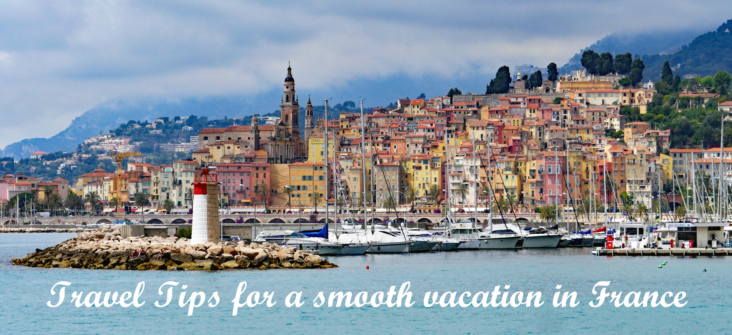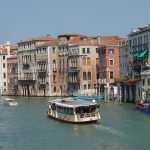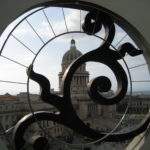France Travel Tips

- TOILETS: Restrooms are few and far between. It costs money to use the toilettes: anywhere from 50 EUR cents to 2 EUR. Always carry loose change. Usually, there is a lady at the door with a cup or saucer. Here she is known as Madame Pi-Pi (but don’t call her that).
- TAXIS: Taxis operate differently here. They cannot be as easily flagged down as you think. One must go to a taxi stop e. bus stop, near a Metro Station, hotel, department store, train station, or tourist attraction. As a rule, they do not take more than 3 passengers. If ever they do, they will charge extra. They will also charge extra after 18:00 and if you have luggage or a lot of bags.
- GRATUITIES: Tipping is different. Most restaurants include the tip on the bill (service compris). However, it is customary to leave a small amount anyway. I always add at least 5% myself. This should be sufficient. If you have any local guides, it is also customary to tip them around $4 to $5 per day for the services. It is also customary to tip porters around 2 EUR per bag and housekeeping about 2 EUR to 5 EUR per night.
- WATER: The water is safe to drink in Paris, but bottled water is often preferred. If you want tap water, ask for une caraffe d’eau. If not you will be brought mineral water and charged for it. There is sparkling (eau petillante) and non sparkling (eau platte).
- COFFEE: Coffee is very strong here, but a little bit longer than your standard espresso. A café au lait can be a good choice, which is usually half milk and half coffee, or even a noisette or café crème which is an espresso with a dash of milk.
- GREETING: Greet people with Bonjour or Bonsoir as this little effort goes a long way here! Ask them if they speak English before you start speaking in English and smile. Don’t catch someone off guard and start talking in English right away. You’ll find they become more receptive if you ask first.
- VAT REFUNDS: VAT is the value added tax and you may be eligible for a discount at stores with the sign tax free on the window. Get the details from the store on the specifics and how to get your money back before departing the country. You must reach a minimum purchase amount to be eligible.
- MONEY: If you need to exchange money upon arrival to the hotel, you can either use traveler’s checks or cash. Remember to bring your passport with you when exchanging money. Most exchange bureaus do charge a small commission when changing traveler’s checks, so always ask what that commission is before finalizing the transaction. You may also wish to use your ATM card to withdraw money, which is often the most convenient and cost-effective way to get cash. Your bank will calculate the exchange rate at home according to what the actual exchange is for that day. Besides what the banks may charge you to withdraw, there are no extra charges. There are ATM machines throughout. Make sure you call your credit card companies and banks to place a travel notification on your account so they allow you to use your cards.
- PARIS METRO: Metro stations are located throughout Parus and will safely get you anywhere you want to go. Pick up a map at your front desk or download the app here to help you get around the city (https://www.ratp.fr/en/apps/ratp-app).
- CELL PHONES: most cell phone companies offer great calling plans for international travel. Call your mobile carrier before traveling to figure out the best options. You can also purchase calling cards while in France from local Tabac shops to use to call home. You may consider keeping your data plan active while traveling so that you can take advantage of useful travel apps, Google maps and more.
- WIFI: It is pretty much available at all hotels these days and most train stations, cafes, and other public places offer it free of charge as well.
- CUSTOMS: For US, you are allowed to bring certain things back into the US with you. Here are your allowances (keep this in mind for shopping): $800 spent in the country per person tax-free. Anything exceeding that amount will be taxed upon arrival into the US. This figure is without the taxes, which is generally between 15 and 20% and is already added to the price. You are also allowed to bring in 1.5 liters of wine or 1 liter of alcohol. Anything in excess will be taxed at home. Anything you purchase that is art, antiques or books is duty-free, so you do not have to claim it on your customs form (not to be included in the allowance amount of $800). Lastly, the above amounts should not include things that you are mailing to yourself in the US; those are counted for separately ($200 duty-free per month). Upon returning to the US, you will be given a customs form to fill out. You should clear customs at your first point of entry back into the US. For Canada, your exemption per person is $750CAN, 1.5 liters of wine and 1.14 liters of alcohol. However, you can include in your $750 amount, things that you are shipping to yourself, but you must fill out a separate form at customs.
- ELECTRICITY: In France, the electrical current is 220 volts. In the US and Canada, it is 110 volts instead. Please do not plug your appliances directly into the wall, or you will get electrocuted! With most appliances, you will need an adaptor (what changes the US/Canadian plug to a French one) and a converter (changes from one voltage to the other, large box-like). Some travel appliances, come with a built-in switch to change the voltage, so for this you only need an adapter. If I have confused you, ask me!
- ATTIRE: Try to wear comfortable walking shoes as there is lots of walking in Paris. Layering is always a great idea as it temperatures may change from day to evening. Comfortable attire is best during thee day for sightseeing and smart casual is best for evenings. It is not common to see the French wear sneakers, flip-flops or shorts to dinner, though you may see tourists doing this.
- SAFETY: Though it is safe to travel through France, especially in tourist areas, you should always be on the lookout for pick-pockets. Crowded areas where tourists are abundant are the worst spots. Make sure you carry purses, wallets and back packs in front of you in these areas and keep your passports in the safe when out and about. A copy should suffice for ID purposes and your driver’s license can work, too.




